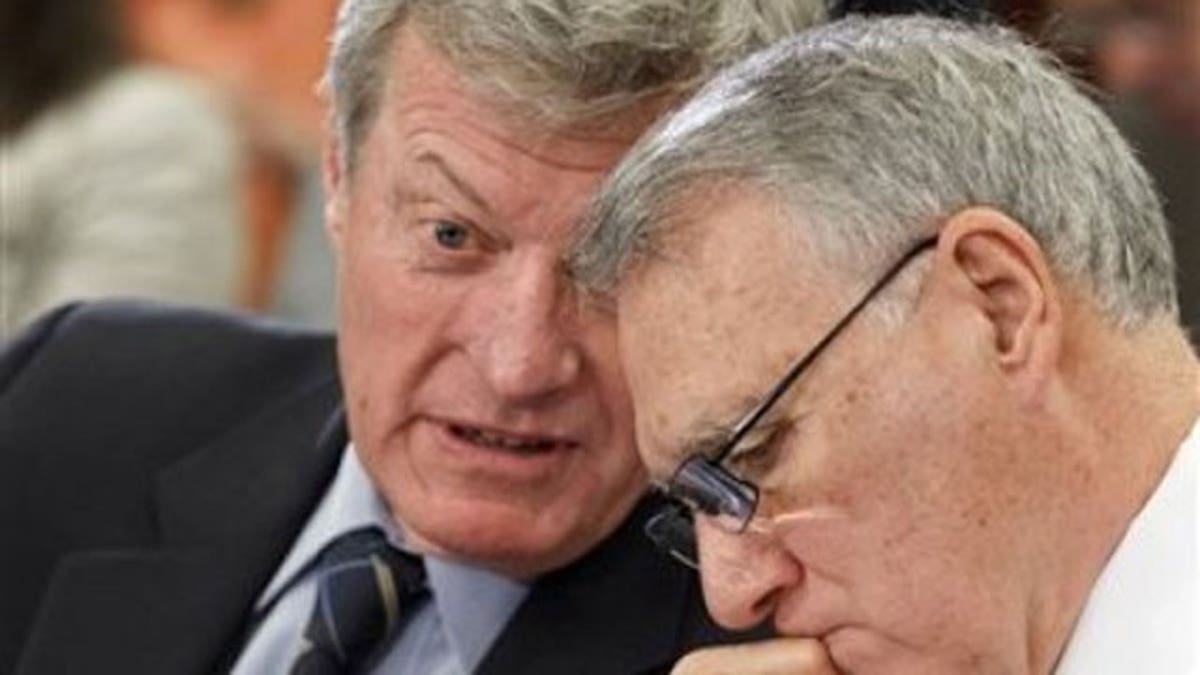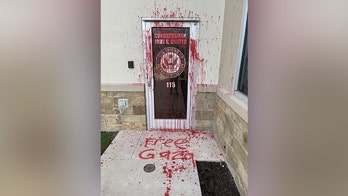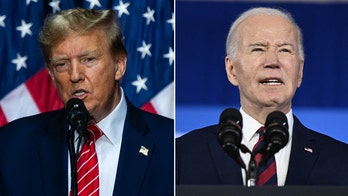
Feb. 1, 2012: Senate Finance Committee Chairman Sen. Max Baucus, D-Mont., left, and Senate Minority Whip Jon Kyl of Ariz. , confer during a meeting of the Payroll Tax conferees, on Capitol Hill in Washington. (AP)
WASHINGTON – Two top lawmakers say the House of Representatives and Senate have sealed a final agreement on legislation to renew a 2 percentage-point cut in the payroll tax and jobless benefits for millions of unemployed workers, a top priority of President Barack Obama.
Democratic Sen. Max Baucus, the Senate Finance Committee Chairman, and Republican Rep. Dave Camp, the House Ways and Means Committee Chairman, confirmed the agreement to Fox News late Wednesday, capping a long day of wrangling over the final details of the measure.
"We're here together to announce that we do have an agreement and we are moving forward," Camp said outside a meeting space.
"This is very important for a lot of people," Baucus added. "160 million Americans are now going to maintain their payroll tax cut. A lot of folks who have lost their jobs through no fault of their own are going to receive unemployment benefits."
However, Camp says the bill isn't done yet, as lawmakers are still hashing out the "legislative language" of the bill behind closed doors.
"We're drafting, and with all drafting there are obviously technical issues that come up," he said. "There are still a few things we need to work out. They're minor and (we) expect that to be finally totally resolved tomorrow."
It's unclear when the bill will be posted or when the House might move the bill, but a senior source says that the text of the bill will not be posted online overnight.
Technically, this means lawmakers can't vote on the bill Friday, as was thought to be the goal. However, the plan may be to still do so.
Both Camp and Baucus told Fox News they don't know when the bill brought to a vote before their respective bodies.
"I don't schedule the floor," said Camp. "I'm going to let our leaders determine that. My job is to try and bring this over the finish line. I'm confident that we can get there."
Senate Majority Leader Harry Reid issued a statement on the agreement early Thursday, saying the deal will "move the economy forward as it is beginning to gain steam."
"Everything should not have to be a fight, and I am glad that most of my Republican colleagues put the interests of the middle class ahead of politics to forge this agreement," Reid said in a statement. "Americans expect us to put our differences aside and find common ground. In the months ahead, I hope this shift to the middle becomes the norm, rather than the exception."
The $150 billion measure represents a tactical retreat for Republicans, who were generally unenthusiastic about the legislation but eager to move beyond the issue. With the campaign season starting, they don't want Obama and Democrats in Congress to be able to claim that the GOP was standing in the way of a middle-class tax cut.
It represented a rare burst of bi-partisanship in a bitterly divided Congress.
The legislation would continue a 2 percentage-point cut in the Social Security payroll tax, renew jobless benefits averaging about $300 a week for people languishing for long periods on unemployment rolls and protect doctors from a huge cut in their Medicare reimbursements.
The measure carries a price tag of roughly $150 billion over the coming year, partly financed by new auctions of telecommunications spectrum to wireless companies and by requiring newly-hired federal workers to contribute more toward their pensions. The pension provision was watered down from a version sought by House Republicans, and tentatively agreed to by key Democrats, that would have required current federal workers to contribute more to their defined benefit pensions.
Auctions of portions of the nation's airwaves to wireless companies would net another $15 billion or so -- even after $7 billion is set aside to construct and run a new public safety network for emergency first responders.
Extending the payroll tax cut and renewing long-term jobless benefits were key planks in Obama's jobs program, which was announced last September but has been largely ignored since. The measures are intended to help the economy by giving people more money to spend, fattening a typical bimonthly paycheck by $40 or so and giving the unemployed critical cash that most of them turn around and spend immediately.
The measure also includes a key adjustment to the badly broken Medicare payment formula for doctors, which would otherwise impose a 27 percent cut on March 1 under a 1997 budget law. The $20 billion cost would be covered in part by cuts to a fund created under Obama's health care law that awards grants for preventive care and by curbs on Medicaid payments to hospitals that care for a disproportionate share of uninsured patients.
House Speaker John Boehner, R-Ohio, said the legislation would probably be voted on by the end of the week. GOP leaders had jump-started the talks over the weekend by dropping a demand that the tax cut be paid for with spending cuts. On Monday, Republicans upped the ante by threatening to advance the payroll tax cut on its own -- and leave jobless benefits and the Medicare fix behind, which set off alarms with Democratic lawmakers and at the White House.
"We were not going to allow the Democrats to continue to play political games and raise taxes on working Americans," Boehner told reporters. "We made the decision to bring them to the table so that the games would stop and we would get this work done."
Some rank-and-file Republicans continued to grumble that the measure was flawed and that the payroll tax cut, first enacted in December of 2010, has done little to prop up the economy. But the prevailing instinct among Republicans was political survival and not wanting to look like they were getting in the way of an election-year tax cut.
"Not going to do this again, but if it gets us through the year, gets this issue off the table, it's worth doing this way," said Sen. Lindsey Graham, R-S.C.
The final snag, aides said, had involved a spat over new auctions of wireless spectrum, a key provision required to help defray the $30 billion cost of extending jobless benefits. House Republicans moved in the Democrats' direction on the amount of money dedicated to creating the public safety communications network for first responders.
Republicans claimed victory in reducing the number of weeks of jobless benefits that workers would be eligible to receive. The maximum number in states with the highest jobless rates would be cut from 99 weeks to 73 weeks by the end of the year, according to aides in both parties. Republicans had wanted to cut the maximum to 59 weeks.
But in states with particularly high unemployment, such as Rhode Island and Nevada, the measure is actually more generous over the next few months than current law.
Negotiators also dropped House-passed language that would have forced low-income people to have Social Security numbers in order to get government checks by claiming the children's tax credit, a move that was aimed at illegal immigrants and caused a furor among many Hispanics.
Republicans also dropped a proposal requiring unemployed people to seek high school equivalency degrees to obtain benefits. But a GOP provision requiring jobless people to be more diligent in job searches as a condition of receiving benefits was included.
The measure also would prevent welfare recipients from using their electronic benefits cards to withdraw money at ATMs in strip clubs, casinos and liquor stores.
Fox News' Chad Pergram and The Associated Press contributed to this report.




